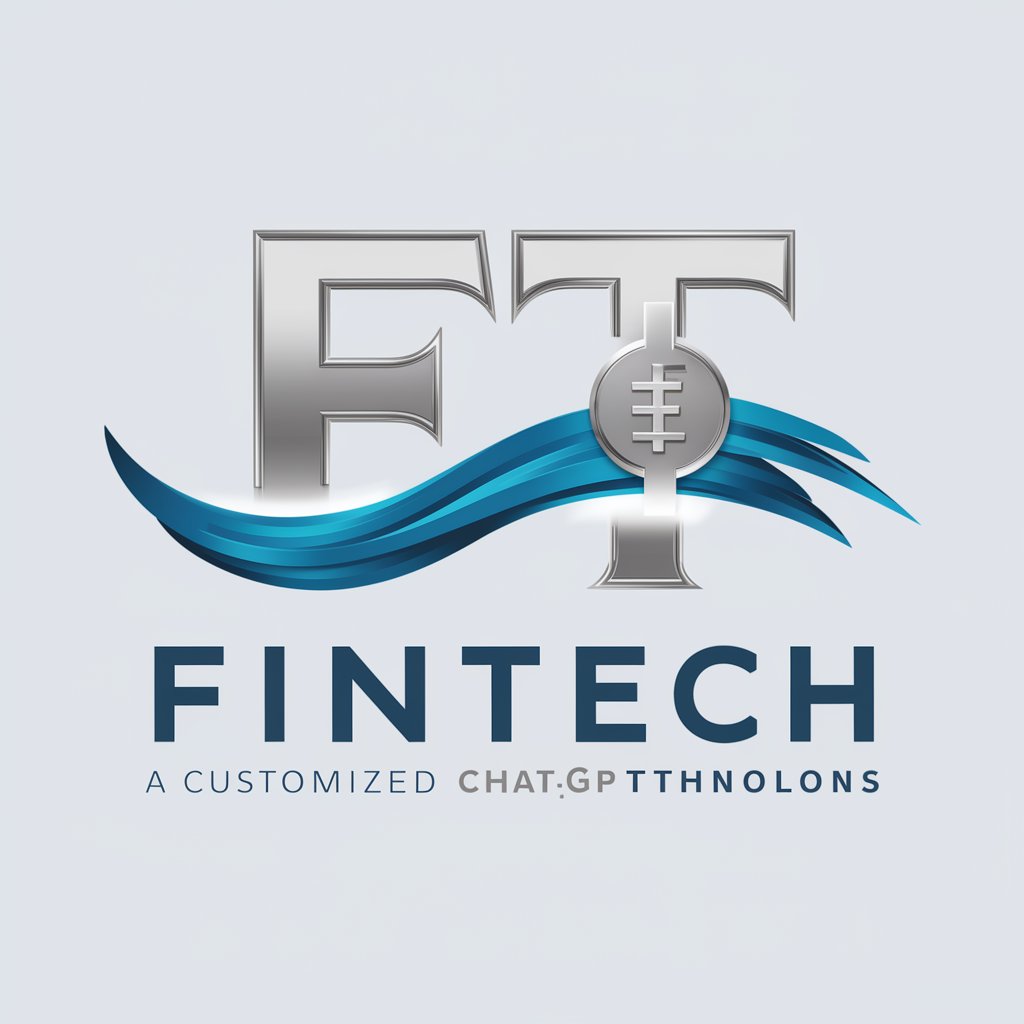FinTech - AI-Powered Financial Tools

Welcome to FinTech, your guide to financial technology innovation.
Empowering Your Finance with AI
What are the latest trends in fintech innovation?
How can blockchain technology enhance financial services?
What are the benefits of using AI in personal finance management?
How do mobile payment apps ensure security and privacy?
Get Embed Code
Introduction to FinTech
FinTech, a blend of 'financial technology,' is a revolutionary approach that seeks to automate, enhance, and simplify the delivery of financial services through cutting-edge software and algorithms. At its essence, FinTech is designed to streamline financial operations, whether it be through digital payments, peer-to-peer lending platforms, automated investment services, or blockchain and cryptocurrency technologies. This sector has transformed traditional financial paradigms by offering solutions that are typically more accessible, faster, and cost-effective than conventional financial services. For example, mobile payment apps like PayPal and Venmo allow users to transfer money and make payments with just a few taps on their smartphones, bypassing the need for physical banking visits or traditional wire transfer services. Similarly, robo-advisors such as Wealthfront and Betterment provide automated, algorithm-based portfolio management advice without the need for a human financial planner. Powered by ChatGPT-4o。

Main Functions of FinTech
Payment and Money Transfer
Example
Mobile payment apps like PayPal, Venmo, and Square Cash
Scenario
These apps allow users to instantly transfer money to friends, family, or businesses directly from their mobile devices, revolutionizing the way personal and commercial transactions are conducted.
Personal Finance Management
Example
Budgeting apps like Mint and YNAB (You Need A Budget)
Scenario
These applications help individuals track their spending, budget, and financial goals, offering insights and advice tailored to personal financial habits and objectives.
Investment and Wealth Management
Example
Robo-advisors like Wealthfront and Betterment
Scenario
Offering automated, algorithm-driven financial planning services with little to no human supervision, these platforms provide personalized investment advice based on the user’s risk tolerance and financial goals, making investment more accessible to the general public.
Lending and Financing
Example
Peer-to-peer (P2P) lending platforms like Lending Club and Prosper
Scenario
These platforms connect borrowers directly with investors, bypassing traditional banking institutions to offer loans with competitive interest rates, often benefiting both lenders and borrowers through more favorable terms.
Insurance Technology (InsurTech)
Example
Platforms like Lemonade and Oscar
Scenario
Utilizing data analytics and machine learning to offer personalized insurance policies, these companies are able to streamline the application process and tailor coverage to individual needs, often resulting in lower premiums and better customer experiences.
Ideal Users of FinTech Services
Individual Consumers
From millennials to tech-savvy older adults, individual consumers seeking convenience, speed, and efficiency in managing their personal finances, investments, and payments are prime users of FinTech services.
Small to Medium-Sized Enterprises (SMEs)
SMEs benefit from FinTech solutions that offer simplified accounting software, easier access to loans, and digital payment systems that enable them to compete more effectively in the digital economy.
Investors and Traders
Both casual and professional investors utilize FinTech for its advanced trading platforms, robo-advisors, and cryptocurrency exchanges, which provide enhanced analytics, real-time data, and automated investment strategies.
Banks and Financial Institutions
These entities leverage FinTech for digital transformation, adopting technologies such as blockchain for secure transactions, AI for customer service, and big data analytics for risk management and personalized services.

Utilizing FinTech for Enhanced Financial Services
Initiate Trial
Begin by visiting yeschat.ai to access a free trial without the need for login or ChatGPT Plus, providing an easy entry into the world of FinTech.
Identify Needs
Determine your specific financial needs, such as budgeting, investing, or managing transactions. This helps in focusing on relevant FinTech features.
Explore Features
Navigate through various FinTech functionalities such as automated investing, real-time analytics, or secure payments to understand how they can optimize your financial management.
Integrate with Financial Tools
Link your existing financial accounts or tools with the FinTech platform to ensure a seamless experience and to leverage the full potential of automated financial services.
Regular Usage and Review
Regularly use the FinTech tool for your financial transactions and periodically review its impact on your financial health to make any necessary adjustments.
Try other advanced and practical GPTs
Chartgpt
Turn data into insights with AI.

Chapgbt
Empowering In-Depth Conversations with AI

Företagsnamnsgenerator
Empower Your Brand with AI-Powered Naming

Expert Landing Page Auditor
Optimize Conversions with AI-Powered Insights

Bookcase Book Finder
Discover Your Next Favorite Book with AI

The Honest Marketer
Marketing wisdom with a comic twist.

Crypto
Empowering your crypto journey with AI

Chatgps
Empower your writing with AI

Launchnow
Accelerate development with AI-powered Launchnow

アートアシスタント
Reviving Renaissance Art with AI

Domænenavnsgenerator
Crafting Your Online Identity with AI

Qimage
Bringing Architectural Visions to Life with AI

Insights into FinTech Functionalities and Applications
How does FinTech improve personal financial management?
FinTech simplifies managing personal finances by offering tools for budgeting, expense tracking, and automated investment advice, thereby enhancing financial decision-making.
Can FinTech assist in business financial operations?
Yes, FinTech can streamline business financial operations through automated invoicing, real-time financial reporting, and efficient payment processing, thus improving operational efficiency.
Is FinTech secure for handling sensitive financial information?
FinTech platforms employ robust security measures like encryption, two-factor authentication, and fraud detection systems to ensure the safety and confidentiality of financial data.
How does FinTech integrate with traditional banking?
FinTech seamlessly integrates with traditional banking by linking bank accounts to FinTech apps, allowing for easy access to banking services and enhanced user experiences.
Can FinTech support international financial transactions?
FinTech facilitates international transactions through features like multi-currency accounts, competitive exchange rates, and lower transaction fees, making global financial dealings more accessible and cost-effective.
